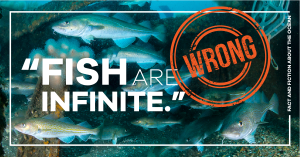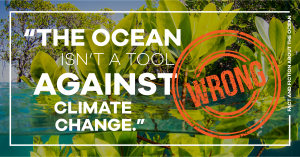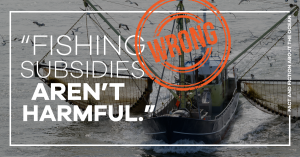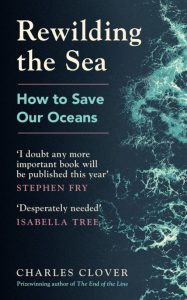Even though the ocean covers two thirds of the planet’s surface, a relatively small proportion of the global population have visited the ocean and experience it. Many of us live inland; in the hustle and bustle of busy cities, in slower suburbia, or deep in the countryside. Despite this, a great many of us feel a connection with the ocean when we do have a chance to visit. And is it any wonder if you consider that medical studies have identified that people who spend time in, around and under the ocean experience reduced cortisol – the stress hormone – and increases in feel-good hormones like serotonin, oxytocin and dopamine?
But feeling connected to something isn’t necessarily understanding it. A great many myths and untruths have built up around the issues facing the ocean, from overfishing to climate change and from economics to regeneration.
Here, we take a moment to unpack some of the fact and fiction about the Big Blue.

Fish are an infinite resource
WRONG
The ocean covers 70 per cent of the Earth’s surface, so it’s understandable when people mistakenly believe that it provides an infinite resource of fish. Common catchphrases like “plenty of fish in the sea” exist to this very day and re-enforce a false idea about the “infinite” resource of fish.
The reality is, as with any species on earth, if you harvest or lose enough of something before it has a chance to reproduce and replenish, it is lost, forever.
Currently, an astounding 45,000 marine species are thought to be at risk of extinction. Included in this number are 37 per cent of sharks and rays including the famous flapper skate, previously called “common skate”, once plentiful on the Dogger Bank and the West of Scotland. And it’s not just skate that are struggling in Scotland – the West of Scotland cod population has declined by 95 per cent in the last 40 years, from 44,962 tonnes to 2,213 tonnes.
The high seas is fairing no better. Scientists recently agreed that only a 30 per cent reduction in catch of yellowfin tuna in the Indian Ocean will save the stock from complete collapse.
Only when we accept that fish can be over fished can we begin to reverse the most significant threat that faces our ocean.

The ocean isn’t a tool against climate change
WRONG
The ocean provides over half of the earth’s oxygen and absorbs vast quantities of CO2 from the atmosphere. The high seas alone captures a quarter of all man-made carbon dioxide. Coastal habitats like seagrass, mangrove and saltmarsh also play a role as vital “blue carbon” habitats, sucking up and storing carbon for millennia. Some seagrass can capture carbon 35 times faster than rainforest. Yet, human activity continues to threaten these crucial habitats, which also play a key role for marine biodiversity as nurseries for fish.
In essence, the healthier the ocean is, the healthier the planet it. The ocean plays a vital role in the entire ecosystem of global health and is one of our most powerful natural mitigators against climate change.
Find out more about the ocean as a climate hero in our article “What the ocean does for us.”

Fishing subsidies aren’t harmful
WRONG
A subsidy is a sum of money granted by a government to a particular industry to help it continue to exist or increase. Fishing was subsidised in a post-war world to help the industry expand rapidly to help with food security. During the cold war, nations also used subsidies to develop large fishing fleets to stake a territorial claim in the ocean. However, times have changed and subsidises are still used in much the same way today as they were more than 50 years ago despite the fact that fish stocks have substantially depleted. Some 94 per cent of fish stocks are overfished or fished at the maximum. This means that subsidies are funding the overexpansion of fishing fleets which are getting better and more efficient at fishing already depleted fish stocks.
To put the scale of subsidised fishing into perspective, governments supply the global fishing industry with over USD 35 billion a year – about 20 to 40 per cent of global landed value of the fish. Of this, 63 per cent (USD 22 billion), is directly linked to harmful capacity enhancing programs which helps foster overfishing. Some of the most heavily subsidised fisheries are those that operate in the high seas. These fleets, as well as being heavily subsidised with public money aren’t just hugely ecologically destructive but are also among the least profitable.
Subsidising the continued overfishing of the ocean has led to a a continuous cyclone of devastation. They have enforced the ability of industrial fisheries to overfish, leading to significantly reduced fish stocks. As those stocks have depleted, so has the financial bottom line of those industries and so more subsidies are required. The irony is, and continues to be, the less we fish, the more there is to catch. Stocks left alone have a chance to reproduce, to regenerate. The sad fact is humans have become so efficient at scooping up this natural resource, we are at the very limits of what the ocean can provide us.
The ocean cannot recover
WRONG
Hope is not lost. The ocean has proved that, if given the time and space to recover, it can do so at impressive speeds. This is ocean “rewilding”. In places, or for species, where human impact has been just too significant, innovative and sometimes radical strategies can be deployed to give nature a helping hand.
In the UK’s Solent – the strait that separates the Isle of Wight from mainland England – just such a restoration is under way. Globally, an estimated 85 per cent of oyster beds and oyster reef habitats have been lost, making them among the most imperilled marine habitats in the world. Now, Blue Marine is creating a model for restoration by re-laying millions of oysters. These sanctuary sites will be created on a large scale in areas closed to commercial fishing and will be allowed to flourish and develop.
Discover more about marine rewilding by reading Blue Marine co-founder and executive director, Charles Clover’s book, Rewilding the Sea: How to Save Our Oceans – out today!

Catch up on our recent articles to celebrate Ocean Week, What the ocean does for us and How you can help the ocean.


















